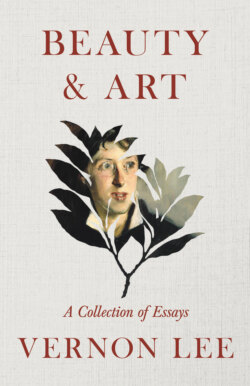Читать книгу Beauty & Art - A Collection of Essays - Vernon Lee - Страница 18
На сайте Литреса книга снята с продажи.
XII
ОглавлениеFor our intimate commerce with beautiful things and beautiful thoughts does not exist only, or even chiefly, at the moment of seeing, or hearing, or reading; nay, if the beautiful touched us only at such separate and special moments, the beautiful would play but an insignificant part in our existence.
As a fact, those moments represent very often only the act of storage, or not much more. Our real æsthetic life is in ourselves, often isolated from the beautiful words, objects, or sounds; sometimes almost unconscious; permeating the whole rest of life in certain highly æsthetic individuals, and, however mixed with other activities, as constant as the life of the intellect and sympathies; nay, as constant as the life of assimilation and motion. We can live off a beautiful object, we can live by its means, even when its visible or audible image is partially, nay, sometimes wholly, obliterated; for the emotional condition can survive the image and be awakened at the mere name, awakened sufficiently to heighten the emotion caused by other images of beauty. We can sometimes feel, so to speak, the spiritual companionship and comfort of a work of art, or of a scene in nature, nay, almost its particular caress to our whole being, when the work of art or the scene has grown faint in our memory, but the emotion it awakened has kept warm.
Now this possibility of storing for later use, of increasing by combination, the impressions of beautiful things, makes art—and by art I mean all æsthetic activity, whether in the professed artist who creates or the unconscious artist who assimilates—the type of such pleasures as are within our own keeping, and makes the æsthetic life typical also of that life of the spirit in which alone we can realise any kind of human freedom. We shall all of us meet with examples thereof if we seek through our consciousness. That such things existed was made clear to me during a weary period of illness, for which I shall always be grateful, since it taught me, in those months of incapacity for enjoyment, that there is a safe kind of pleasure, the pleasure we can defer. I spent part of that time at Tangier, surrounded by everything which could delight me, and in none of which I took any real delight. I did not enjoy Tangier at the time, but I have enjoyed Tangier ever since, on the principle of the bee eating its honey months after making it. The reality of Tangier, I mean the reality of my presence there, and the state of my nerves, were not in the relation of enjoyment. But how often has not the image of Tangier, the remembrance of what I saw and did there, returned and haunted me in the most enjoyable fashion.
After all, is it not often the case with pictures, statues, journeys, and the reading of books? The weariness entailed, the mere continuity of looking or attending, quite apart from tiresome accompanying circumstances, make the apparently real act, what we expect to be the act of enjoyment, quite illusory; like Coleridge, "we see, not feel, how beautiful things are." Later on, all odious accompanying circumstances are utterly forgotten, eliminated, and the weariness is gone: we enjoy not merely unhampered by accidents, but in the very way our heart desires. For we can choose—our mood unconsciously does it for us—the right moment and right accessories for consuming some of our stored delights; moreover, we can add what condiments and make what mixtures suit us best at that moment. We draw not merely upon one past reality, making its essentials present, but upon dozens. To revert to Tangier (whose experience first brought these possibilities clearly before me), I find I enjoy it in connection with Venice, the mixture having a special roundness of tone or flavour. Similarly, I once heard Bach's Magnificat, with St. Mark's of Venice as a background in my imagination. Again, certain moonlight songs of Schumann have blended wonderfully with remembrances of old Italian villas. King Solomon, in all his ships, could not have carried the things which I can draw, in less than a second, from one tiny convolution of my brain, from one corner of my mind. No wizard that ever lived had spells which could evoke such kingdoms and worlds as anyone of us can conjure up with certain words: Greece, the Middle Ages, Orpheus, Robin Hood, Mary Stuart, Ancient Rome, the Far East.
